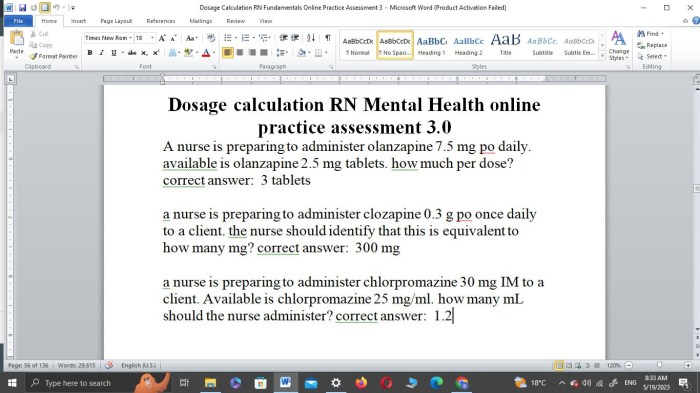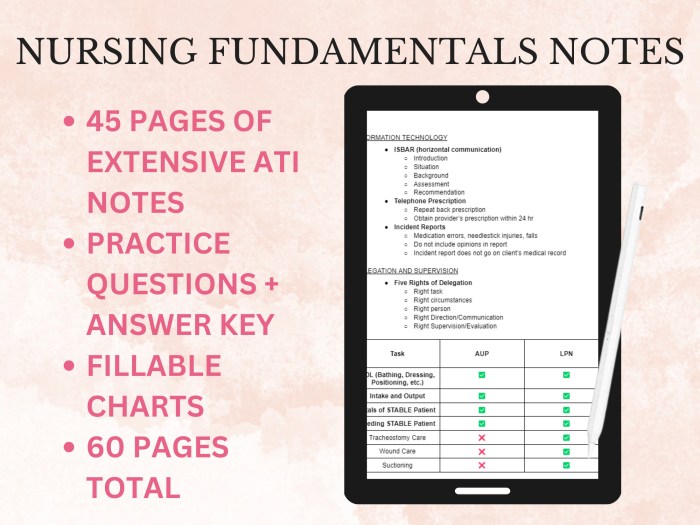Embark on a comprehensive learning journey with Dosage Calculation RN Fundamentals Online Practice Assessment 3.0. This interactive platform empowers nurses to master the intricacies of dosage calculation, ensuring the safe and effective administration of medications. Through a captivating blend of theory, practical exercises, and real-world case studies, this assessment provides a transformative experience that elevates nursing practice.
As healthcare professionals entrusted with the well-being of patients, nurses play a pivotal role in ensuring medication safety. Accurate dosage calculation is paramount, as even minor errors can have serious consequences. This assessment equips nurses with the knowledge and skills necessary to navigate the complexities of medication administration, promoting optimal patient outcomes.
Dosage Calculation Basics

Dosage calculation is a fundamental skill for nurses, ensuring accurate and safe medication administration. It involves determining the correct dose of a medication based on factors such as the patient’s weight, age, and condition.
Common dosage calculations include:
- Weight-based dosing: Calculating the dose based on the patient’s weight in kilograms or pounds.
- Age-based dosing: Calculating the dose based on the patient’s age in years.
- Body surface area (BSA) dosing: Calculating the dose based on the patient’s BSA, which is an estimate of their total skin surface area.
Accuracy in dosage calculation is paramount to prevent medication errors and ensure patient safety.
Medication Administration
Medication administration is a crucial nursing responsibility, involving the safe and effective delivery of medications to patients.
Best practices include:
- Verifying the patient’s identity, medication order, and dose before administration.
- Using the correct route of administration and technique.
- Documenting the administration time, dose, and patient response.
Common errors in medication administration include:
- Dosage errors
- Route errors
- Patient identification errors
Nurses play a vital role in ensuring safe medication administration by following protocols, using appropriate equipment, and monitoring patients for adverse reactions.
IV Therapy
IV therapy involves administering medications, fluids, or nutrients directly into a vein.
Principles of IV therapy include:
- Calculating the infusion rate based on the patient’s fluid needs and medication dosage.
- Monitoring the patient for potential complications, such as infiltration or infection.
- Using aseptic technique to prevent contamination.
Common IV medications include:
- Antibiotics
- Chemotherapy drugs
- Electrolytes
Complications associated with IV therapy can include:
- Infiltration
- Infection
- Phlebitis
Fluid and Electrolyte Balance

Fluid and electrolyte balance is essential for maintaining normal body functions.
Principles of fluid and electrolyte balance include:
- Maintaining fluid intake and output
- Regulating electrolyte levels
- Monitoring for fluid and electrolyte imbalances
Common fluid and electrolyte imbalances include:
- Dehydration
- Hypervolemia
- Hyponatremia
- Hyperkalemia
Nursing interventions for fluid and electrolyte imbalances focus on restoring balance and preventing complications.
Medication Safety
Medication safety is a top priority in healthcare, aiming to prevent medication errors.
Principles of medication safety include:
- Using standardized medication administration systems
- Implementing patient safety checks
- Educating patients about their medications
Common medication errors include:
- Dosage errors
- Route errors
- Medication mix-ups
Nurses play a crucial role in promoting medication safety by adhering to protocols, reporting errors, and educating patients.
Patient Education: Dosage Calculation Rn Fundamentals Online Practice Assessment 3.0
Patient education is essential in dosage calculation, ensuring patients understand their medications and how to take them correctly.
Effective patient education strategies include:
- Using clear and concise language
- Providing written instructions
- Answering patient questions
Nurses play a vital role in providing patient education, empowering patients to manage their own health.
Case Studies

Case studies provide practical examples of dosage calculation principles.
Learning objectives of case studies include:
- Applying dosage calculation formulas
- Analyzing patient data
- Making clinical decisions
Case studies can be used to assess students’ understanding and prepare them for real-world nursing practice.
Quick FAQs
What are the benefits of using Dosage Calculation RN Fundamentals Online Practice Assessment 3.0?
This assessment offers numerous benefits, including enhanced accuracy in dosage calculation, improved medication safety practices, reduced medication errors, and increased patient satisfaction.
How does the assessment ensure the accuracy of dosage calculations?
The assessment provides a structured approach to dosage calculation, utilizing real-world scenarios and interactive exercises to reinforce understanding and minimize errors.
What types of case studies are included in the assessment?
The assessment features a diverse range of case studies covering various clinical scenarios, challenging nurses to apply their knowledge and make informed decisions.